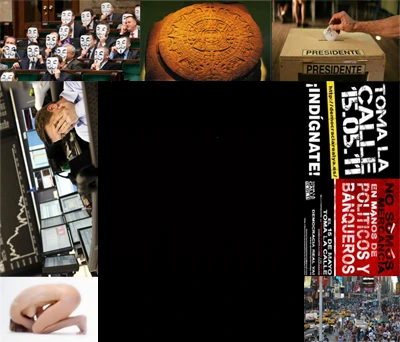Crisis as Art of Government
(pp. 21-29; DOI:10.23692/iMex.4.4)
 Cargando...
Cargando...
 Cargando...
Cargando...Dr. Dario Gentili
 He holds a PhD in “Ethics and Political-Legal Philosophy” at the University of Salerno. He was Post doc in “Philosophy and History of Ideas” at the Sum (Italian Institute of Human Sciences), Florence, and received a DAAD post-doc grant in the Walter Benjamin archives in Berlin. Currently he holds an Honorary Fellowship in Moral Philosophy at the Department of Philosophy, University of Roma Tre, and he is research fellow at the Sum (Italian Institute of Human Sciences).
He holds a PhD in “Ethics and Political-Legal Philosophy” at the University of Salerno. He was Post doc in “Philosophy and History of Ideas” at the Sum (Italian Institute of Human Sciences), Florence, and received a DAAD post-doc grant in the Walter Benjamin archives in Berlin. Currently he holds an Honorary Fellowship in Moral Philosophy at the Department of Philosophy, University of Roma Tre, and he is research fellow at the Sum (Italian Institute of Human Sciences).
Main publications: Il tempo della storia. Le tesi “sul concetto di storia” di Walter Benjamin, Guida, Napoli 2002; Topografie politiche. Spazio urbano, cittadinanza, confini in Walter Benjamin e Jacques Derrida, Quodlibet, Macerata 2009; Italian Theory. Dall’operaismo alla biopolitica, Il Mulino, Bologna 2012.
The concepts of crisis and conflict are inextricably linked to notions of modernity and draw on such heterogenous disciplines as political sciences, philosophy, economics and psychoanalysis. This paper aims to identify and analyze the so called ‘apparatus of crisis’ starting from the ancient Greece conception of krisis in medical and political fields. On the strength of the bio-political genealogy of crisis, I argue that the diffusion and the pervasiveness of the term ‘crisis’ are not at all signs of semantic ‘vagueness’, as Reihart Koselleck affirms, but rather denote the ‘highest effectiveness of its apparatus’ the highest effectiveness that is apparent nowadays, when the crisis has become the ‘art of government’ par excellence. The nature of each crisis has set a specific concept and practice of conflict and, therefore, a specific process of political subjectification. Unlike the past, today the predominant apparatus of crisis has a manifest biopolitical nature and so it implies the neoliberalism’s axiom that “there is no alternative”, and therefore tends to neutralize the conflict and to marginalize in the precarity the forms of life that could be constituent expressions of it. Is it therefore possible to think of the conflict and its processes of subjectification as pulled out from the apparatus of the neo-liberal crisis?
Vittoria Borsò - Editorial
Rosa Beltrán - Supervivencia del más apto
Roberto Esposito - Estímulo
Dario Gentili - Crisis as Art of Government
José Luis Villacañas Berlanga - Tiempo e imperio: El caso Moctezuma
Tanius Karam Cárdenas - Gobernabilidad democrática
Valerio Rocco Lozano - Lógica de la abstracción
David Sánchez Usanos - La cosmética del poder
Fernando Castro Flórez - ... algo huele a podrido
Reseña

